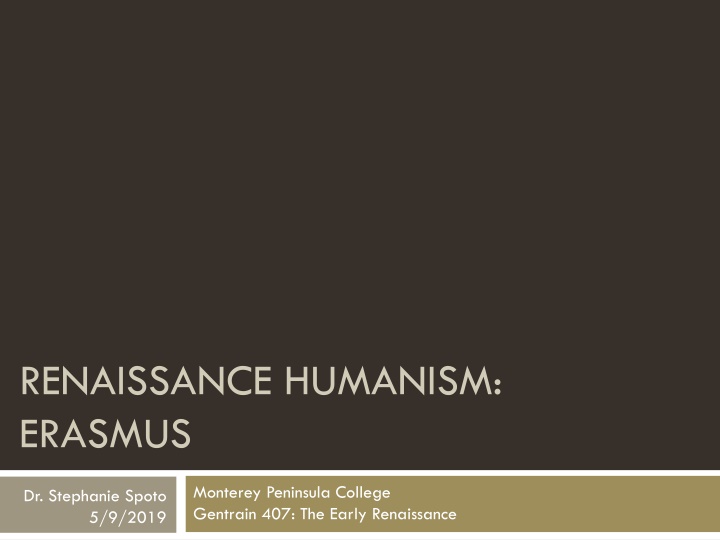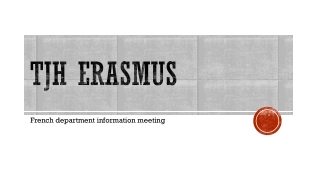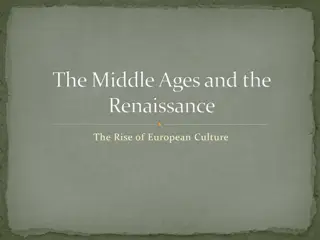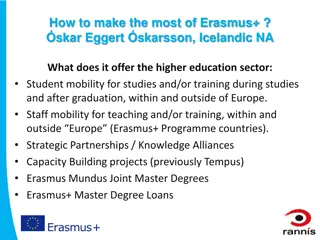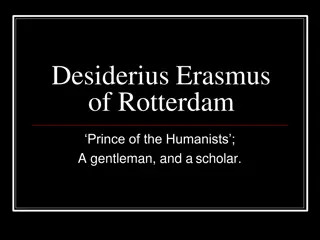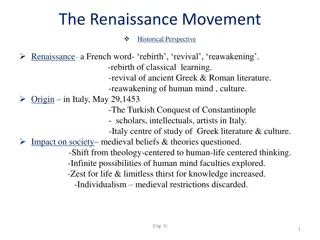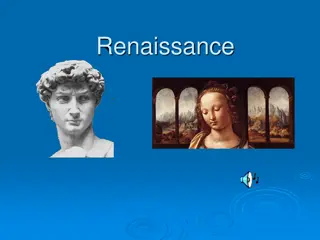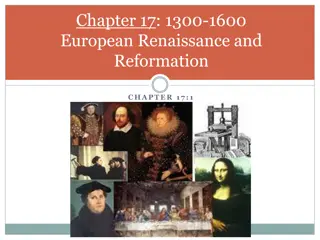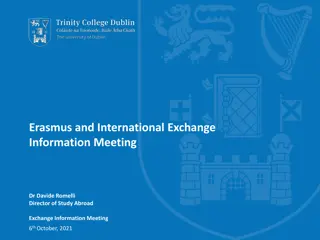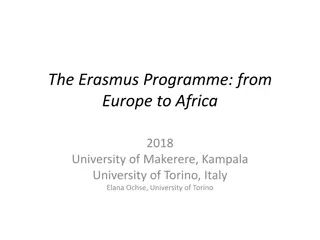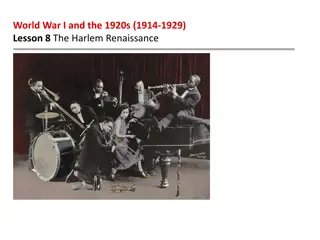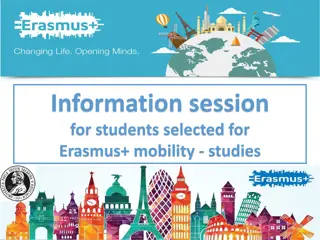Erasmus: Prince of Humanism and Renaissance Scholar
Explore the life and contributions of Erasmus, a prominent Christian humanist of the Northern Renaissance. Known for his scholarly works, Erasmus played a vital role in the revival of classical learning and the development of humanistic thought in Europe. His translations and philosophical reflections left a lasting impact on the intellectual landscape of his time and beyond.
Download Presentation

Please find below an Image/Link to download the presentation.
The content on the website is provided AS IS for your information and personal use only. It may not be sold, licensed, or shared on other websites without obtaining consent from the author.If you encounter any issues during the download, it is possible that the publisher has removed the file from their server.
You are allowed to download the files provided on this website for personal or commercial use, subject to the condition that they are used lawfully. All files are the property of their respective owners.
The content on the website is provided AS IS for your information and personal use only. It may not be sold, licensed, or shared on other websites without obtaining consent from the author.
E N D
Presentation Transcript
RENAISSANCE HUMANISM: ERASMUS Monterey Peninsula College Gentrain 407: The Early Renaissance Dr. Stephanie Spoto 5/9/2019
Humanism Study of classical antiquity A shift in focus from exclusive study of religion towards the study of humankind Returning interest in the pagan classics stimulated three major shifts in European philosophy: the philosophy of secularism the appreciation of worldly pleasures Assertion of personal independence and individual expression Crossroads between medieval supernaturalism and modern skeptical and scientific paradigms
Erasmus, Prince of the Humanists 1466-1536 Desiderius Erasmus Roterodamus (Erasmus or Erasmus of Rotterdam) Dutch Christian humanist Tracey James calls him the greatest scholar of the northern Renaissance. Christian priest Prince of the Humanists and the crowing glory of the Christian humanists. Wrote in the pure Latin style part of the revival of Ciceronian Latin
Translations and contributions Created new and important Latin and Greek editions of the New Testament used humanist techniques for working on the text These translations raised important questions that would be influential in the Protestant Reformation and then later the Catholic Counter-Reformation Author of number of works, including: Handbook of a Christian Knight, 1503/1533 In Praise of Folly, 1509 Copia: Foundations of the Abundant Style, 1512 Julius Exclusus, 1514 On Free Will, 1524 On Civility in Children, 1530
Erasmus as philosopher Not a systematic philosopher though there are themes that he is interested in and what we might call an Erasmian habit of mind . The subjects of his writing were often philosophical or invited philosophical reflection, such as: Nature versus nurture The relationship between word and thing Nature of faith What is the ideal form of government? Epistemology: theory of knowledge Works widely circulated and read views are interesting to historians today opinion maker Portrait of Desiderius Erasmus by Albrecht D rer, 1526, engraved in Nuremberg, Germany.
Erasmus and the Church Lived during the development of the Reformation Critical of abuses in the church called for reform Distanced himself from reformers of what would be later called the Protestant Reformation, like Martin Luther, Henry VIII and John Calvin continued to recognize the authority of the Pope. Remained member of Catholic Church his whole life Importance of middle way (via media) Respect of piety, grace and tradition faith rejected Luther s faith alone. Adhered to Catholic doctrine of free will against the reformers doctrine of predestination
Impartiality Erasmus attempted to be impartial during philosophical, political, and theological disputes His middle way approach angered both Catholics and reformers (Luther famously nailed his 95 theses to the door of the Wittenberg Castle Church) o Was critical of the Catholic church and was called to join reformers was loyal to the church and wanted to reform it from within
Luther and Erasmus Luther in 1526 letter to Erasmus: "Free will does not exist sin makes human beings utterly incapable of submitting themselves to God. Respected each other Eramus called Luther "a mighty trumpet of gospel truth Erasmus: "It is clear that many of the reforms for which Luther calls are urgently needed. Luther s reformation seemed the natural development from Erasmus s writings Luther wanted to remain independent Martin Luther (1529) by Lucas Cranach the Elder
An epistle against those who falsely boast they are Evangelicals to Vulturius Neocomus (Gerardus Geldenhouwer), 1529 You declaim bitterly against the luxury of priests, the ambition of bishops, the tyranny of the Roman Pontiff, and the babbling of the sophists; against our prayers, fasts, and Masses; and you are not content to retrench the abuses that may be in these things, but must needs abolish them entirely... Look around on this Evangelical generation,and observe whether amongst them less indulgence is given to luxury, lust, or avarice, than amongst those whom you so detest. Show me any one person who by that Gospel has been reclaimed from drunkenness to sobriety, from fury and passion to meekness, from avarice to liberality, from reviling to well-speaking, from wantonness to modesty. I will show you a great many who have become worse through following it....The solemn prayers of the Church are abolished, but now there are very many who never pray at all....
An epistle against those who falsely boast they are Evangelicals to Vulturius Neocomus (Gerardus Geldenhouwer), 1529 I have never entered their conventicles, but I have sometimes seen them returning from their sermons, the countenances of all of them displaying rage, and wonderful ferocity, as though they were animated by the evil spirit.... Who ever beheld in their meetings any one of them shedding tears, smiting his breast, or grieving for his sins ?... Confession to the priest is abolished, but very few now confess to God.... They have fled from Judaism that they may become Epicureans.
Free Will In 1524 On Free Will, enters into the field of doctrinal controversy Rejects Luther s doctrine of free will Doesn t suggest action For Erasmians this was a merit for Lutherans this was a fault Claims more free will than Luther allowed to St Augustine and St Paul freedom of choice is central of Erasmus Protestantism garnered popular movement Erasmus distanced himself from it and moved when his city of Basel adopted Reformation in 1529 Portrait of Erasmus of Rotterdam (1523) by Hans Holbein the Younger
Religious toleration Some works (like De libero arbitrio 1514) argued for religious toleration Urged Lutherans to be more temperate in their language"because in this way the truth, which is often lost amidst too much wrangling may be more surely perceived. Gary Remer (Humanism and the Rhetoric of Toleration 1996): "Like Cicero, Erasmus concludes that truth is furthered by a more harmonious relationship between interlocutors. Did not oppose the punishment of heretics in general however in individual cases he argued for moderation: "It is better to cure a sick man than to kill him." Place of publication Printer/publisher Year (month) Basileae Apvd Ioannem Beb. (1524)
